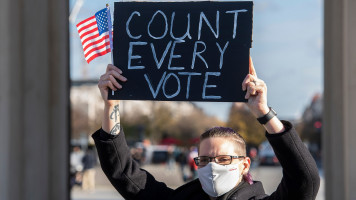Tensions rise in Israel's coalition as Ben-Gvir withholds support over Palestinian prisoners, arms shipment to PA
The Israeli government may be one step closer to fracturing after a vital ruling coalition member announced that his party will not stick to coalition lines in future votes in the Knesset.
The far-right Otzmah Yehudit, or Jewish Power party leader Itamar Ben-Gvir, announced on Wednesday, 13 September, that his party would withhold support to the coalition unless the government agreed to restrict visitation rights for Palestinian security prisoners.
On Tuesday, the security cabinet held a "situation assessment" ahead of the upcoming Jewish holidays and decided there would be no changes regarding the "security prisoners" until after a discussion in October.
Ben-Gvir has long been waging a campaign to decrease the prisoners' family visitation rights from once a month to once every two months, prompting threats from Palestinian prisoners to go on a hunger strike.
Tensions have increased following a report that Israel approved an arms shipment to the Palestinian Authority (PA).
Israel's Army Radio reported that the United States had supplied 1,500 assault rifles to Palestinian security services in the occupied West Bank, with Israel approving the deal on condition the weapons be used against the militant Hamas and Islamic Jihad groups.
The hardline Itamar Ben-Gvir, whose party backs policies favouring nationalist settler groups, reacted angrily, demanding that Netanyahu issue a public denial. At the same time, his coalition ally, Finance Minister Bezalel Smothrich, was reported by Israeli media as "seething".
Prime Minister Benjamin Netanyahu denied the report after hard-right ministers in his coalition expressed outrage.
Netanyahu dismissed the report as "fake news" but acknowledged that the government had approved the transfer of several armoured vehicles, which the previous government had agreed.
A spokesperson for the Palestinian security services, Talal Dweikat, denied the report on Wafa official news agency, saying that the Palestinian Authority received no equipment through Israel.
A US embassy spokesperson also denied the report, saying, "US security assistance to the Palestinian Authority (PA) does not include provision of weapons or ammunition to the PA security forces".
The incident, 30 years after the signing of the Oslo Accords that created the PA, underlined the tensions that have appeared in Netanyahu's religious-nationalist coalition amid spiralling violence across the occupied West Bank.
Israel has demanded sweeping crackdowns by the PA, which exercises limited governance in some of the main centres of militant activity, such as the northern occupied West Bank cities of Jenin and Nablus. In turn, the PA accuses Israel of undermining its credibility and making it impossible to act against heavily armed militant groups, many supported by Iran.
The Islamist group Hamas condemned the reports of military aid to the Palestinian security services, saying the move aimed to "strengthen these apparatuses to confront the escalating resistance in the occupied West Bank."
The uproar by the Israeli far-right ministers over the arms shipment report cast a shadow of doubt over recent messages of an imminent normalisation deal between Israel and Saudi Arabia.
US Secretary of State Antony Blinken has recently indicated that the Saudis have suggested to the Americans that "if this process [of normalisation with Israel] is to move forward, the Palestinian piece is going to be very important".





 Follow the Middle East's top stories in English at The New Arab on Google News
Follow the Middle East's top stories in English at The New Arab on Google News


![Algeciras port [Getty]](/sites/default/files/styles/image_330x185/public/75377010.jpeg?h=327453ef&itok=KfCFUEza)